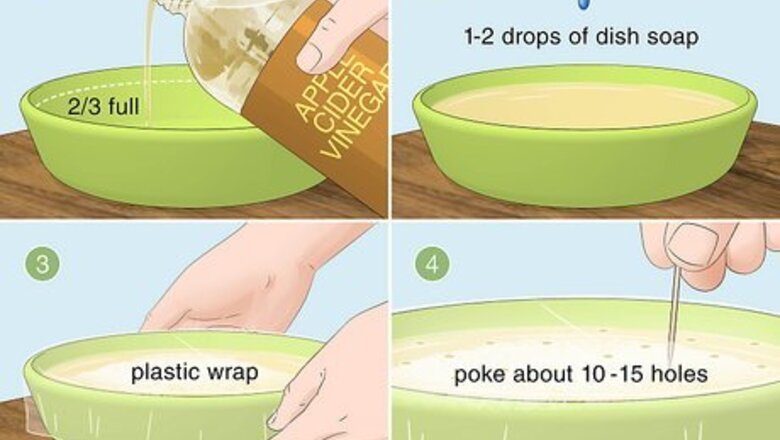
views
- Catch fruit flies in a bowl filled with apple cider vinegar and a few drops of dish soap. Cover the bowl with plastic wrap so flies can get in but not escape.
- Roll a piece of paper into a cone and stick it inside of a glass jar with ripe fruit. Empty the trap and replace the bait every 2–3 days to get rid of the flies.
- Spray fruit flies directly with rubbing alcohol or an aerosol insecticide to kill them on contact.
- Get rid of any overripe fruit where fruit flies might lay eggs to keep them from coming back.
Catching Fruit Flies in Traps
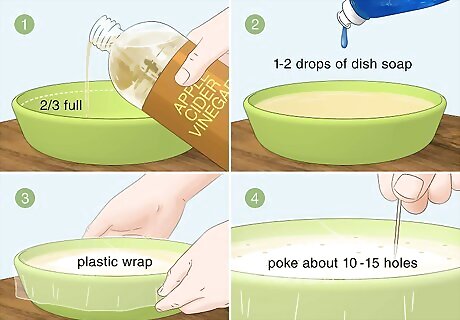
Use a bowl with apple cider vinegar and dish soap to catch the flies. Pour enough apple cider vinegar into a bowl so it’s two-thirds full. Add a drop or two of liquid dish soap to the bowl, and then cover it with a sheet of plastic wrap. Poke about 10–15 holes in the wrap with a toothpick and set it out to attract the fruit flies. Fruit flies will be drawn to the scent of the vinegar and drown when they come into contact with the soapy surface. The plastic wrap prevents any fruit flies from escaping once they crawl inside.Get Rid of Fruit Flies Step 1Bullet1.jpg Empty the bowl and replace the bait every 2–3 days until your fruit fly infestation clears up. Fruit flies usually only survive for 1–2 weeks, so it won’t take long to catch them all.Get Rid of Fruit Flies Step 1Bullet2.jpg Avoid using distilled white vinegar since it doesn’t attract fruit flies very well.Get Rid of Fruit Flies Step 1Bullet3.jpg
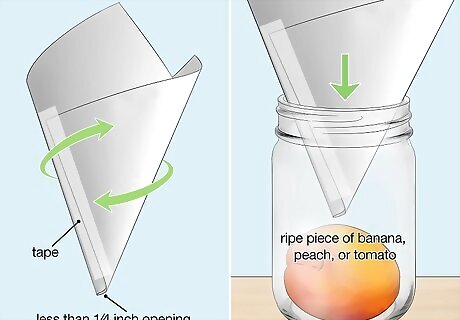
Trap flies with a paper funnel and jar baited with fruit. Roll a regular piece of paper into a cone so the opening at the point is less than ⁄4 inch (0.64 cm). Tape the paper so it holds its shape. Set a ripe piece of banana, peach, or tomato inside a jar. Set the point of the cone in the jar so it’s just above the bait. After a few days, toss out the trap and replace it with fresh bait. The fruit flies will go down the funnel toward the bait, but they won’t be able to find their way back out and get stuck.Get Rid of Fruit Flies Step 2Bullet1.jpg Stick the trap in your freezer overnight to humanely kill the flies before throwing away the old bait. That way, they won’t fly away or stay alive in your trash.Get Rid of Fruit Flies Step 2Bullet2.jpg Try to throw the trap out within 7 days to keep new fruit fly larvae from hatching in your home.
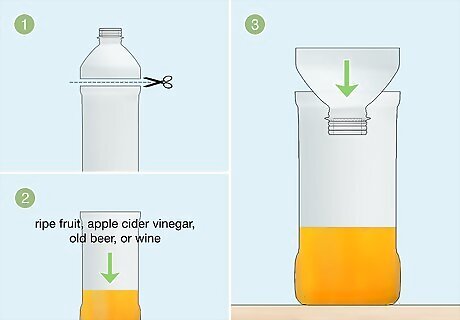
Turn a plastic bottle into a funnel trap for a cheap and effective fix. Cut the top of a plastic soda bottle off just above the label. Put ripe fruit, apple cider vinegar, old beer, or wine in the bottom section of the bottle. Take the cap off the top section of the bottle, and place it upside-down inside the lower section. Leave your trap out in your kitchen for 2–3 days to capture the flies. Flies will be able to fly down into the bottle trap, but they won’t be able to get out by themselves.Get Rid of Fruit Flies Step 3Bullet1.jpg Alternatively, take an old beer or wine bottle that still has a little bit inside and cover the top with a piece of plastic wrap. Poke a hole or two in the plastic wrap so flies can crawl in but are unable to get out.
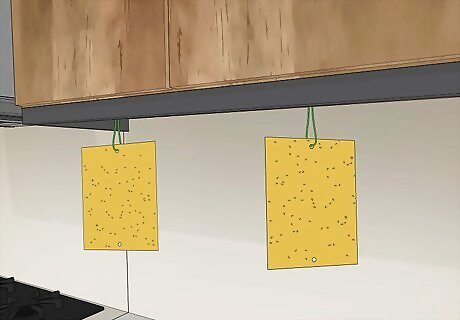
Try hanging up strips of flypaper in problem areas. Place the adhesive flypaper where you’ve seen the most fruit flies, which will normally be in your kitchen near the trash or by the sink. Leave the flypaper up as long as you see fruit flies in your home. If the strips fill up with flies, take them down and throw them away. Flypaper may not be as effective against fruit flies as standard house flies, but it can still catch the ones that didn’t get stuck in a trap.
Spraying Fruit Flies
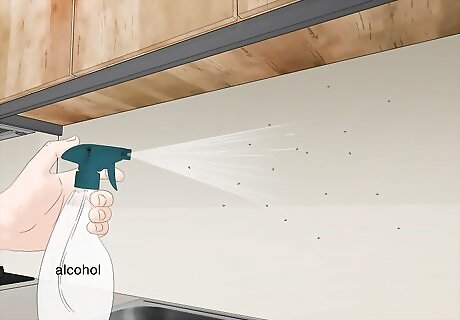
Spray rubbing alcohol directly on flies to kill them instantly. Fill a spray bottle with any rubbing alcohol that you have around your home. When you see any fruit flies hovering around in your home, apply the spray directly to the insects so they die on the spot. Avoid spraying the rubbing alcohol onto any fruit since it could cause it to spoil and attract even more flies.
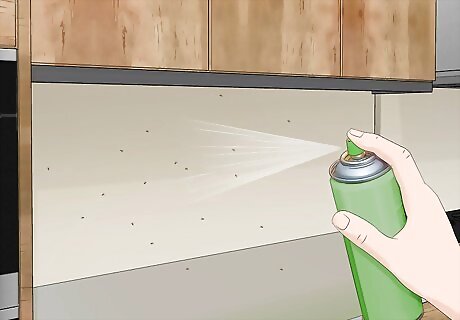
Use an indoor aerosol insecticide to get rid of large swarms. Point the spray nozzle at the fruit flies and press the button down to spray them with the insecticide. Since the instructions may vary depending on the brand you’re using, always read the label and instructions on the insecticide to ensure you’re applying it properly. Avoid spraying insecticide on any food or cooking surfaces so you don’t contaminate anything you’re going to eat.
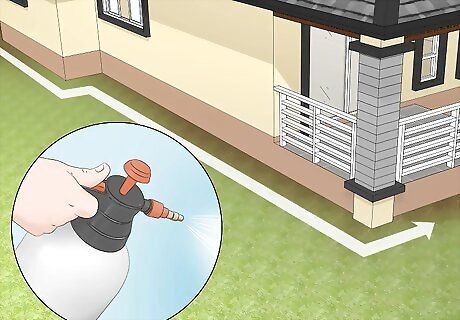
Try applying to Spinosad insecticide for fruit flies outside. If you notice any fruit flies outside of your home, load the insecticide into a garden sprayer and apply it around the base of your home. If you’re growing any fruits or vegetables in a garden, be sure to treat them directly with Spinosad as well to kill any fruit flies that stop by for a meal. Spinosad impacts a fruit fly’s nervous system to kill it, but it doesn’t pose any serious threats to pets or other animals. You can safely use it around pets and children. Rinse off any fruits and veggies that you applied Spinosad to before you eat them. Try to limit your exposure to Spinosad since it could cause slight eye irritation or allergic reactions.
Preventing Fruit Flies
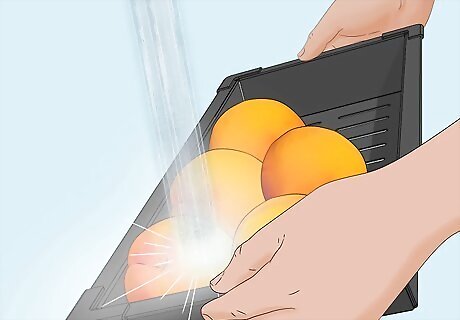
Wash fruits and veggies when you bring them in your kitchen. As soon as you bring fresh produce in from the grocery store or garden, rinse it under clean water. Check the fruit and vegetables for damage, bruises, and soft spots, which could all be signs that fruit flies have gotten to them. Get rid of any damaged fruit to keep the flies away from your other fresh produce. EXPERT TIP Kevin Carrillo Kevin Carrillo MMPC, Pest Control Specialist Kevin Carrillo is a Pest Control Specialist and the Senior Project Manager for MMPC, a pest control service and certified Minority-owned Business Enterprise (MBE) based in the New York City area. MMPC is certified by the industry’s leading codes and practices, including the National Pest Management Association (NPMA), QualityPro, GreenPro, and The New York Pest Management Association (NYPMA). MMPC's work has been featured in CNN, NPR, and ABC News. Kevin Carrillo Kevin Carrillo MMPC, Pest Control Specialist How do fruit flies enter my home? Fruit flies typically enter your house on the produce you buy. The fruit you bring inside, especially tropical fruit, usually has fruit fly eggs already on it. To prevent the eggs from hatching, scrub your fruit under running water with a brush to destroy the eggs. Or, you can keep the fruit in your fridge.
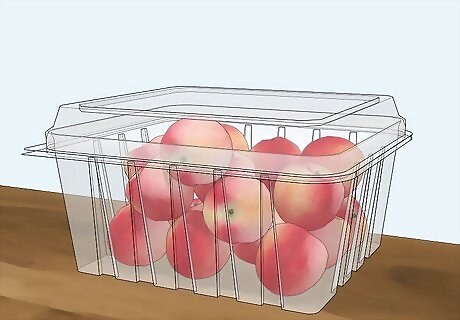
Store produce in your fridge or a covered container. Rather than keeping fruit out in the open, place it in a bowl that has a lid or cover it with plastic wrap to prevent flies from getting to it. Alternatively, just put your produce in the fridge where fruit flies can’t survive the cold temperatures. As soon as your fruit starts softening or going bad, throw it away so fruit flies don’t lay eggs on it.
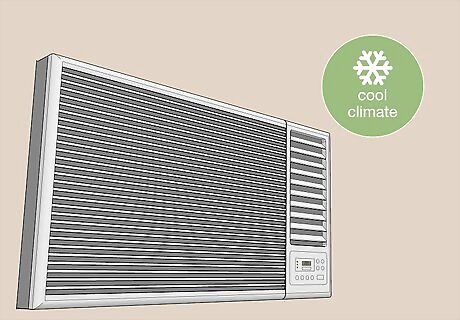
Keep your home cool to deter flies. Fruit flies thrive in warmer climates and during the summer months, but they’re less likely to hang around your kitchen when it’s colder. Run a fan or air conditioner to keep your kitchen at a consistent temperature to keep the flies away.
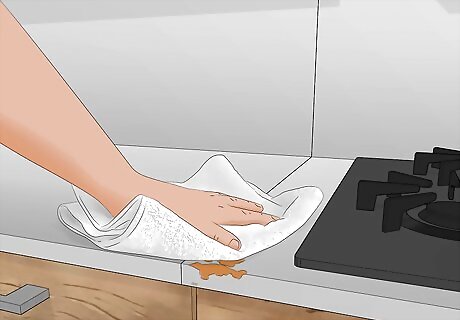
Clean up food spills right away. As soon as you spill anything sweet or syrupy on your counters or floors, wipe it up with soapy water to get rid of all the residue. Focus especially on cracks and seams where food particles could get caught since fruit flies will be able to reach them. For stubborn spills, apply a multipurpose cleaner and scrub the residue away with a clean cloth. Try to keep your kitchen tidy by wiping up after you cook and doing a thorough clean once a week. Be sure to wipe your cabinets and any other surfaces that come into contact with food as well.
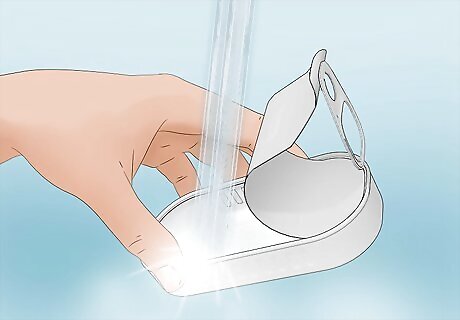
Rinse out empty cans and bottles before tossing them. Since fruit flies are attracted to the liquid residue that’s left from soda, juice, beer, and wine, avoid tossing out the containers as soon as they’re empty. Swish a little clean water inside of the container and dump it out in your sink before putting it in your recycling bin. Store empty cans and bottles outside of your kitchen if you’re able to so you reduce the risk of fruit flies getting inside.
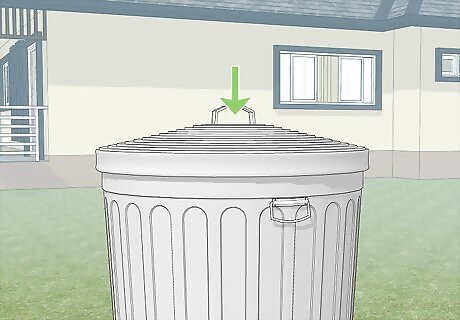
Take out your kitchen garbage regularly. Keep your trash in a can with a closed lid to help keep fruit flies out. When your garbage is full or after you throw away food scraps, tie up the bag and take it to an outdoor receptacle or dumpster so flies don’t lay their eggs in the trash. Clean out the bottom of your trash can with soapy water if you notice any liquid or spills inside.
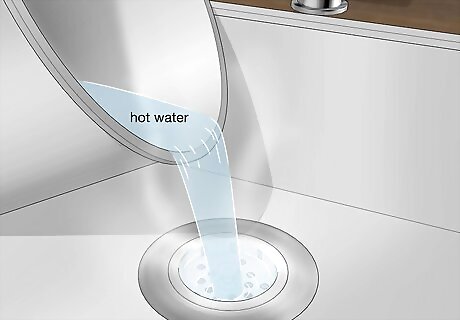
Clean and sterilize your sink drains. Try to clean your sink drains at least once a week to prevent any food buildup from forming inside where fruit flies could lay eggs. When you finish cleaning your drain, boil a pot of water and pour it down the drain to sterilize it and kill any eggs that might have been laid.




















Comments
0 comment